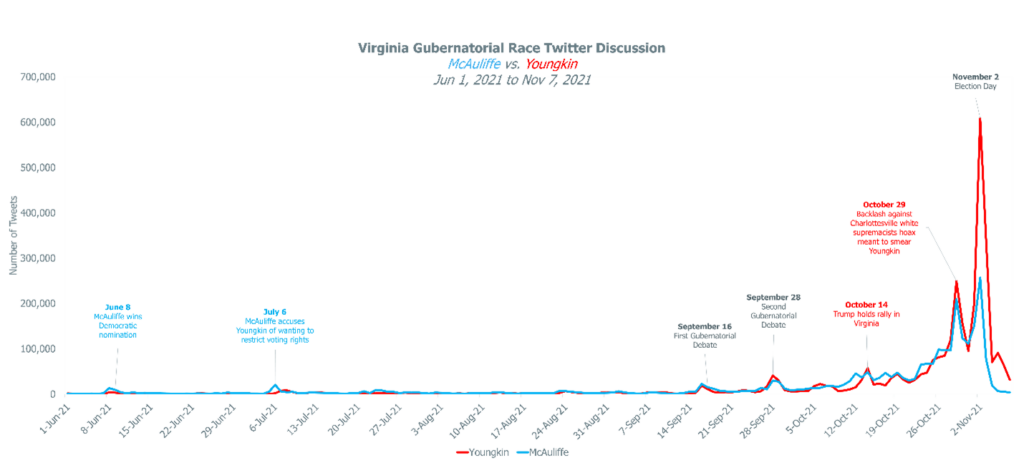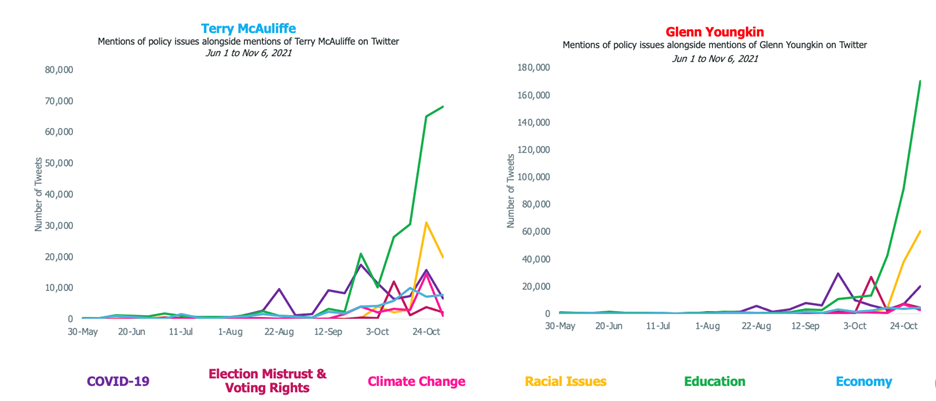The Virginia gubernatorial election between the former Carlyle CEO Glenn Youngkin and the former Democratic governor Terry McAuliffe was one of the most high-profile elections of the 2021 cycle. On November 2nd, the former won the Governor’s Mansion by over two points in a state that President Biden had won by 10 points just a year earlier, culminating the most expensive election in the state’s history — over $115 million in combined fundraising.
Our team conducted an analysis of the Twitter conversation from June 1 to November 6, 2021, in search of the underlying themes and messages of both campaigns. We analyzed close to 6.2 million tweets mentioning the candidates or terms surrounding the election and identified a nationalized race that was strongly defined by education-related issues.
The second debate was a significant turning point in the race, shifting focus from a broader set of issues to a race focused on public education.

The early campaigns were local by nature, driven by kitchen table issues mostly focused on mask and vaccine mandates, reproductive health, and voting rights. More specifically, both vaccine mandates and abortion accounted for most spikes in conversation during the summer and were central to the first gubernatorial debate on September 16.
Two weeks later, the race leapt onto the national stage following the second gubernatorial debate on September 28, where Terry McAuliffe claimed, “I don’t think parents should be telling schools what they should teach.” The Youngkin campaign capitalized on the Democratic candidate’s comments and pivoted its main messaging to one stressing the importance of parental input on their children’s education.
The Republican candidate’s campaign tailored broader education-related policy issues to specific voter subsets, accompanied by crafted messaging around Critical Race Theory and the Loudon County public school system’s alleged failure to address a case of sexual assault. Following the second debate in late September, the volume of conversation around both campaigns spiked dramatically, with education emerging as the single most popular policy issue.

Beyond education, which was the dominant policy issue within the conversations surrounding both candidates, the Youngkin campaign focused on tax cuts while the McAuliffe campaign prioritized strengthening the economy through job creation.
Youngkin’s campaign drove an out-sized education-focused campaign in the latter half of the election cycle, as evidenced in the volume of conversation surrounding his campaign mentioning the policy area compared to that of the McAuliffe campaign. The latter, which made the decision to maintain the candidate’s claim against parental control in classrooms, was forced to react to Youngkin’s messaging, albeit to a lesser extent.

Aside from broader education issues and COVID-19, the economy was also central to the election as the candidates debated how to foster long-term economic growth. Youngkin’s campaign streamlined its messaging around making Virginia more business- and consumer-friendly, starting with the elimination of the grocery tax and the suspension of the recently increased gasoline tax. McAuliffe, on the other hand, drew on his success in creating jobs during his first term as governor to signal his ability to continue to do so.
Our analysis shows a clear focus on education as the leading issue, and continued acceleration of conversation following the key turning point in the Sep 28 debate. While other issues played a role, education issues defined the race as it entered the national stage.
FTP is proud to provide ongoing research, trends, and expert opinion and insights to provide our clients with high level resources. You can reach our insights team for access to our full analysis: CGallagher@forbes-tate.com.
